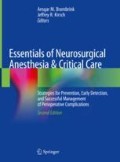Abstract
Upper gastrointestinal bleeding (UGIB) is a common medical condition that results in high morbidity and mortality. Stress-related ulcers are the most common cause of UGIB in critically ill patients. Mechanical ventilation greater than 48 h and coagulopathy are significant risk factors for stress ulceration and overt GI bleeding. Stress ulcer prophylaxis can include the use of proton pump inhibitors (PPI), histamine H2 receptor antagonists (H2RA), sucralfate, antacids, and enteral nutrition. The initial evaluation of an overt UGIB involves an assessment of hemodynamic stability and the necessity for fluid and blood resuscitation. Upon stabilization of the patient, the use IV PPI, continuous or intermittent dosing, is a first-line pharmacologic intervention in overt UGIB. All patients with UGIB require urgent gastroenterology consultation and endoscopy.
Access this chapter
Tax calculation will be finalised at checkout
Purchases are for personal use only
References and Suggested Reading
Barkun AN, Bardou M, Pham CQ, Martel M. Proton pump inhibitors vs. histamine 2 receptor antagonists for stress-related mucosal bleeding prophylaxis in critically ill patients: a meta-analysis. Am J Gastroenterol. 2012;107:507–20.
Buendgens L, Koch A, Tacke F. Prevention of stress-related ulcer bleeding at the intensive care unit: risks and benefits of stress ulcer prophylaxis. World J Crit Care Med. 2016;5(1):57–64.
Cappell M, Friedel D. Initial management of acute upper gastrointestinal bleeding: from initial evaluation up to gastrointestinal endoscopy. Med Clin N Am. 2008;92:491–509.
Cook DJ, Fuller HD, Guyatt GH, et al. Risk factors for gastrointestinal bleeding in critically ill patients. Canadian Critical Care Trials Group. N Engl J Med. 1994;330(6):377–81.
Cook DJ, Griffith LE, Walter SD, et al. The attributable mortality and length of intensive care unit stay of clinically important gastrointestinal bleeding in critically ill patients. Crit Care. 2001;5(6):368–75.
Dellinger RP, Levy MM, Rhodes A, et al. Surviving sepsis campaign: international guidelines for management of severe sepsis and septic shock, 2012. Intensive Care Med. 2013;39(2):165–228.
Kwok CS, Arthur AK, Anibueze CI, et al. Risk of Clostridium difficile infection with acid suppressing drugs and antibiotics: meta-analysis. Am J Gastroenterol. 2012;107:1011–9.
Liu B, Liu S, Yin A, et al. Risks and benefits of stress ulcer prophylaxis in adult neurocritical care patients: a systematic review and meta-analysis of randomized controlled trials. Crit Care. 2015;19:409.
Lu WY, Rhoney DH, Boling WB, et al. A review of stress ulcer prophylaxis in the neurosurgical intensive care unit. Neurosurgery. 1997;41:416–25.
MacLaren R, Reynolds PM, Allen RR. Histamine-2 receptor antagonists vs proton pump inhibitors on gastrointestinal tract hemorrhage and infectious complications in the intensive care unit. JAMA Intern Med. 2014;174:564–74.
Sachar H, Vaidya K, Laine L. Intermittent vs continuous proton pump inhibitor therapy for high-risk bleeding ulcers: a systematic review and meta-analysis. JAMA Intern Med. 2014;174:1755–62.
Sesler JM. Stress-related mucosal disease in the intensive care unit. AACN Adv Crit Care. 2007;18(2):119–28.
Venkatesh B, Towsend S, Boots R. Does splanchnic ischemia occur in isolated neurotrauma? A prospective observational study. Crit Care Med. 1999;27(6):1175–80.
Zheng K, Wu G, Cheng NN, Yao CJ, Zhou LF. High risk factors of upper gastrointestinal bleeding after neurosurgical procedures. Chung-Hua Hsueh Tsa Chih [Chin Med J]. 2005;85(48):3387–91.
Author information
Authors and Affiliations
Editor information
Editors and Affiliations
Rights and permissions
Copyright information
© 2020 Springer Nature Switzerland AG
About this chapter
Cite this chapter
White, C.R., Vagnerova, K. (2020). Gastrointestinal Hemorrhage in Neurosurgical Critical Care. In: Brambrink, A., Kirsch, J. (eds) Essentials of Neurosurgical Anesthesia & Critical Care. Springer, Cham. https://doi.org/10.1007/978-3-030-17410-1_93
Download citation
DOI: https://doi.org/10.1007/978-3-030-17410-1_93
Published:
Publisher Name: Springer, Cham
Print ISBN: 978-3-030-17408-8
Online ISBN: 978-3-030-17410-1
eBook Packages: MedicineMedicine (R0)

